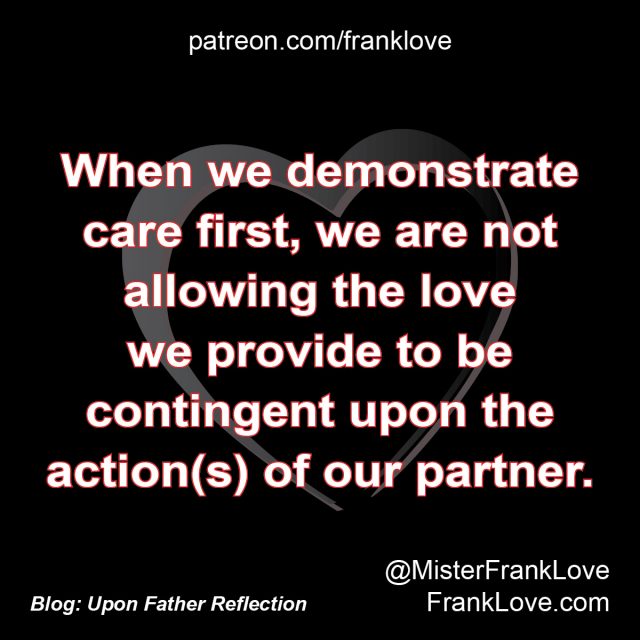In my previous blog, “How to Deal When Your Partner Is Lying to You — It Depends,” I explain how partners should consider handling lying in their loving relationship. In today’s blog post, I talk about why it is important to choose your words carefully in your loving relationship.
Taking Care of Our Friends, Friendships, and Relationships
 Once again, I appreciate the opportunity to sit at my father’s feet and listen to his wisdom. He recently shared a story around a mistake that he made and how he believes he could have handled the situation better. It was a lesson of insensitivity. He previously shared one on empathy.
Once again, I appreciate the opportunity to sit at my father’s feet and listen to his wisdom. He recently shared a story around a mistake that he made and how he believes he could have handled the situation better. It was a lesson of insensitivity. He previously shared one on empathy.
My father, Kofi, went to Howard University in the ’60s as an art major. There he worked with many of the top African American visual artists. One of them was a teacher and mentor. We’ll call him James.According to my father, James was always supportive of Kofi and his efforts.
After graduating, any time Kofi asked James to speak or assist, James made himself available. James could be depended on, and Kofi appreciated his friendship. Fast forward 20 years or so. James hosted an art exhibit, and my father attended. He asked Kofi what he thought of his work.
Kofi responded, “What the hell is that!?!” Needless to say, Kofi didn’t like the art or didn’t understand it. James was hurt by the response. Almost instantaneously, Kofi knew James was offended . . . and he cared. A few days later, Kofi attempted to call James. He did not respond to the message Kofi left. A week later, Kofi left another message. No response.
Finally, Kofi wrote him a letter. The letter was an apology that attempted to bring the relationship back together. It didn’t work. The hurt was there. A brief comment ended a long-standing relationship that Kofi valued. It was the last conversation they ever had.
I have heard the adage: “Say what you wish. Those who mind won’t matter, and those who matter won’t mind.” I have believed it, and I have said it. However, it is an incomplete concept.
It is an error to think or act as if insulting people in our life does not matter. The belief that those individuals who matter to us won’t mind being insulted (and if they mind being insulted, then they don’t matter to us) is contrived and shortsighted.
People matter. People are also sensitive, and each of us has the opportunity to care about their sensitivities (or not to). Many of us say whatever we want to say to the people around us under the guise of sharing the truth or being honest. But we show little consideration or care for the people that we are talking to. Their histories. Their challenges. Their frailties.
My father reflected on his comment to James and notes, “I wish I would have been older.” He went further and said, “Given my age and understanding at the time, there was no way that I could have known to be more careful with my words and to keep my mouth shut and my opinion to myself at times. I was careless.” He also wishes he would have tried even harder to repair the relationship; perhaps giving a gift would have made a difference. He isn’t sure it would have, but he is sure that the pain and disappointment remains long after his comment.
What does any of this have to do with relationships? Many of us are careless with our words when we could be careful as we deal with and interact with our partners. We say what we feel instead of what will nurture, heal, or improve the relationship, situation, or issue. We are led by our impulses instead of what we wish to create.
Everyone may not be equipped to hear what we want to say; in a loving relationship, they may not need to because we will be invested in taking care of them. This investment can exist even when we have a strong opinion or feelings about an issue.
Some may ask, “What about James taking care of Kofi? Wasn’t there a level of care that James should have had for Kofi? Did he have to be so hard on him and completely end the relationship, given their history?”
Care, ideally, works both ways, and is an obligation that gets to exist between two people who are committed to caring for one another.
However, that dynamic is superseded by the obligation that requires each of us to “go first.” It is also worth noting that James had gone first. Remember, he had invested in Kofi, as a mentor and friend, over the course of many years prior.

Going first means that we demonstrate care first. We are not waiting on the other party or our partner to do so in order for us to initiate care. When we demonstrate care first, we do not allow it to be contingent on the actions of anyone else. We do it because it is the loving thing to do and because we are invested in being loving.
Should I be able to say whatever I want to say to my partner? It is my hope that you would not want to.
There is an axiom that says, “In silence man can most readily preserve his integrity.” Please consider this and my father’s story when a temptation to carelessly express ourself is in the air. Let’s also consider simply tempering our words. Let’s think about what it is that we wish to create, and let’s think about whether what we are moved to share will get us there. And that can be very loving.
Keep Rising,
Frank Love
In my next blog, “The Superpower of Support, Part II,” I talk about different ways you can show support for your partner, even when you disagree with them.
Watch Frank Love’s presentation “The Act of Caring.”
Subscribe to receive Frank’s weekly blog.
Become a sponsor of Frank Love and his work creating loving cultures in our relationships with a monthly contribution of as little as $2. Sign up today at Patreon.com/FrankLove.
–—–—–—–—–—–—–—–—–—–—–—–—–—–—–—–—––
Each week, Frank Love hosts Zoom support group meetings that assist women and men as we work to create a loving culture in our relationships. Calls occur from 7 p.m. to 8:30 p.m. EST and can be accessed by visiting FrankWeeklyCall.com.
- Tuesdays—Black Women: Creating a Loving Culture in Our Relationships
- Thursdays—Black Men: Creating a Loving Culture in Our Relationships
–—–—–—–—–—–—–—–—–—–—–—–—–—–—–—–—– –
Frank Love coaches individuals toward creating a loving culture in their family. He is also the author of Relationship Conversations You Don’t Want to Have (But Should Anyway) and 25 Ways to Be Loving. To schedule a free consultation, contact Frank at Frank@FrankLove.com.

